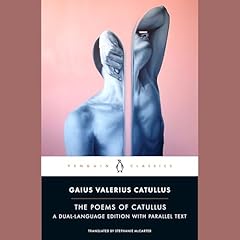
Catullus: The Complete Poems
No se pudo agregar al carrito
Solo puedes tener X títulos en el carrito para realizar el pago.
Add to Cart failed.
Por favor prueba de nuevo más tarde
Error al Agregar a Lista de Deseos.
Por favor prueba de nuevo más tarde
Error al eliminar de la lista de deseos.
Por favor prueba de nuevo más tarde
Error al añadir a tu biblioteca
Por favor intenta de nuevo
Error al seguir el podcast
Intenta nuevamente
Error al dejar de seguir el podcast
Intenta nuevamente
 Exclusivo para miembros Prime: ¿Nuevo en Audible? Obtén 2 audiolibros gratis con tu prueba.
Exclusivo para miembros Prime: ¿Nuevo en Audible? Obtén 2 audiolibros gratis con tu prueba.
Elige 1 audiolibro al mes de nuestra inigualable colección.
Acceso ilimitado a nuestro catálogo de más de 150,000 audiolibros y podcasts.
Accede a ofertas y descuentos exclusivos.
Premium Plus se renueva automáticamente por $14.95 al mes después de 30 días. Cancela en cualquier momento.
Compra ahora por $13.62
-
Narrado por:
-
Charlton Griffin
-
De:
-
Catullus
Acerbic wit and stinging satire are contrasted with delicate sensibility and passionate desire in the work of the Latin poet Catullus. Armed with an urbane sophistication and an aristocratic circle of friends, Catullus moved about easily in the upper ranks of Roman society and was acquainted with Cicero, Caesar, and Pompey among others. His poems describe the lifestyle prevalent among his circle in the middle of the first century B.C. But it is his description of his love affair with a married woman he calls "Lesbia" which is the basis of his fame. His influence on later Latin poets and Renaissance writers was immense.
Public Domain (P)2010 Audio ConnoisseurLos oyentes también disfrutaron:




















Las personas que vieron esto también vieron:

A mature man reads a young man's poems
Se ha producido un error. Vuelve a intentarlo dentro de unos minutos.


